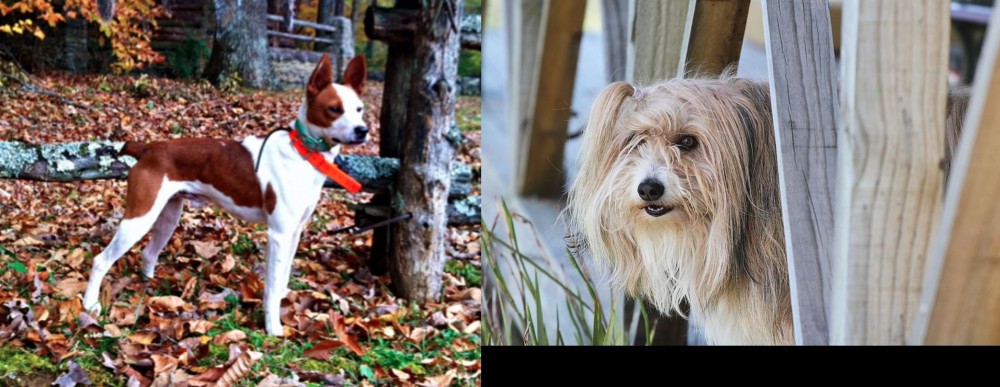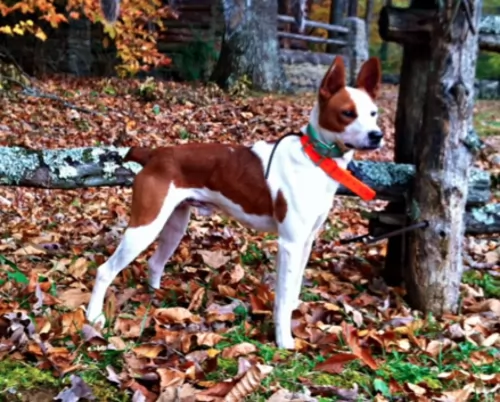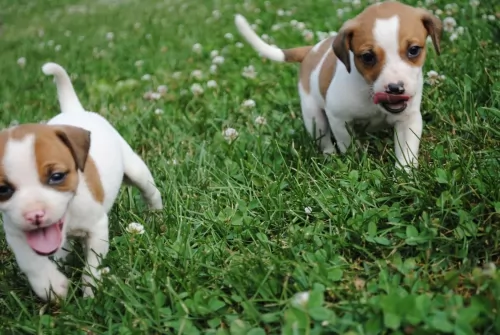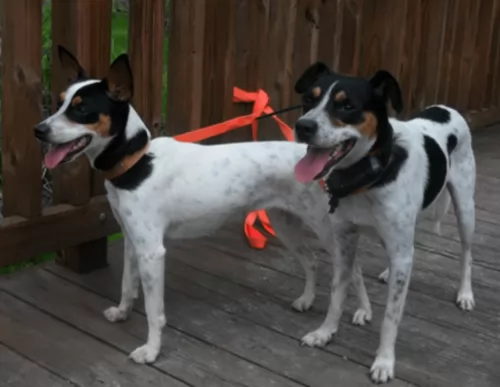 Petzlover
Petzlover Mountain Feist is originated from United States but Smithfield is originated from United Kingdom. Both Mountain Feist and Smithfield are having almost same height. Mountain Feist may weigh 29 kg / 64 pounds more than Smithfield. Mountain Feist may live 4 years more than Smithfield. Both Mountain Feist and Smithfield has same litter size. Mountain Feist requires Low Maintenance. But Smithfield requires Moderate Maintenance
Mountain Feist is originated from United States but Smithfield is originated from United Kingdom. Both Mountain Feist and Smithfield are having almost same height. Mountain Feist may weigh 29 kg / 64 pounds more than Smithfield. Mountain Feist may live 4 years more than Smithfield. Both Mountain Feist and Smithfield has same litter size. Mountain Feist requires Low Maintenance. But Smithfield requires Moderate Maintenance
 In the Southern portion of North America, the Mountain Feist was developed. It is the Ozarks and Southern Appalachia that the Mountain Fiest calls his ancestral home. The breed dates back centuries and looks very much like a Jack Russell or rat terrier. George Washington, Abraham Lincoln and William Faulkner all featured the breed in their writings. For Washington it was his diary, Lincoln the poem “The Bear Hunt” and Faulkner “Go Down Moses”. These dogs, much like the Curs, were an important part of the early pioneer days in America.
In the Southern portion of North America, the Mountain Feist was developed. It is the Ozarks and Southern Appalachia that the Mountain Fiest calls his ancestral home. The breed dates back centuries and looks very much like a Jack Russell or rat terrier. George Washington, Abraham Lincoln and William Faulkner all featured the breed in their writings. For Washington it was his diary, Lincoln the poem “The Bear Hunt” and Faulkner “Go Down Moses”. These dogs, much like the Curs, were an important part of the early pioneer days in America.
The name Feist means a noisy, small dog in ancient languages. The Feist was developed in the South, the rural areas, in order to hunt and eliminate vermin and small prey animals. The breed was originally a cross between British terriers and hounds from Native Americans. Many others think the feist is not a breed but a type, a working dog which can vary individual to individual.
The Mountain Feist of today has been bred for hunting performance over generations of time. They hunt racoons, squirrel and rabbits among others. They can track even larger game. Other varieties of the feist include the Bench Legged Feist and the Pencil-tail Feist. This is an energetic working dog, curious, intelligent and alert. It is a loud, barky dog that needs to learn a “no bark” command or it may drive you crazy. The breed make good hunting dogs, watch dogs and companions.
The breed was recognized by the United Kennel Club (UKC) in 2015, but not by the AKC or American Kennel Club. Other breed organizations include the National Cur & Feist Breeder’s Association, The National Feist Breeder’s Association, The American Treeing Feist Association, and the Shadowtails Outdoors Group.
 The Smithfield is also known as the Smithfield, Smithy or Tasmanian Smithfield and is a herding dog found in Australia but originating in the UK. There is also the possibility that there was an Australian dog bred at a place known as Smithfield, near Texas which is just inside the Queensland border.
The Smithfield is also known as the Smithfield, Smithy or Tasmanian Smithfield and is a herding dog found in Australia but originating in the UK. There is also the possibility that there was an Australian dog bred at a place known as Smithfield, near Texas which is just inside the Queensland border.
It is thought by some that the Smithfield is extinct. The dog was first introduced to the Land Down Under in colonial times.
The Smithfield isn’t recognised by the Canine Councils, but in 1862 the first Dog Show was held in Australia.
 The Mountain Feist is a medium sized dog with pointy ears that are long and fold over. With their sharp nails that are curved they can climb. Their hind legs are strong to support that activity as well. They have small, dark eyes, a black nose and a muzzle that is medium length and a round skull. The neck is strong, and they have a pretty deep chest. The Mountain Feist tail is bushy, high and erect. There coats come in a variety of colors including blue, black, white, red and brown with the brown being the most common.
The Mountain Feist is a medium sized dog with pointy ears that are long and fold over. With their sharp nails that are curved they can climb. Their hind legs are strong to support that activity as well. They have small, dark eyes, a black nose and a muzzle that is medium length and a round skull. The neck is strong, and they have a pretty deep chest. The Mountain Feist tail is bushy, high and erect. There coats come in a variety of colors including blue, black, white, red and brown with the brown being the most common.
There is a lot of variation of make up and type within the breed itself. Until the last decade or so the breed was fairly isolated among squirrel hunters and there was little cross breeding with other dogs. On the other hand, dogs in the regions where the Mountain Feist was isolated were crossed with them to give them the tree climbing ability, change their size, sharpen their senses or one particular sense and change their appearance.
This is why in different regions you will find Mountain Feist with attributes of the Curs, or the Elkhounds, the Terriers, Spitz or Coonhounds. This accounts for the various types of Mountain Feist Dogs.
 The Smithfield is a medium to large sized dog, strong and square-bodied with a wedge shaped head. Many people liken his looks to a Bearded Collie.
The Smithfield is a medium to large sized dog, strong and square-bodied with a wedge shaped head. Many people liken his looks to a Bearded Collie.
He has a rough, medium length coat. The coat has different colors such as white, black, grey or reddish brown. The coat is shaggy and in fact they are often clipped to give them a groomed look and to prevent grass and burrs clinging to the coat.
The tail of the dog can either be a natural bobtail or it could have a longer tail. When the tail is long it is carried low with an upward turn at the tip. The ears are mostly floppy and held close to the head.
He stands at between 46 to 53cm in height and weighs between 16 and 25kg. A bright, alert expression is a distinctive feature of the Smithfield.
The Smithfield is an active, robust dog and they have well balanced, stable personalities. They are often described as being laid-back.
You won’t find any signs of shyness or aggression with these dogs and they are known to be gentle and calm. They are self confident and well adjusted and also hard working.
They are devoted and loving to their human family and are also intelligent. When they’ve been trained and socialized they make splendid family pets, wonderful with children, just loving to run and play. These are dogs you can rely on to be consistent in nature.
 Yes, they very much enjoy playing with children.
Yes, they very much enjoy playing with children.
Tree climbing and stamina.
They need space and land on which to run every day. If you are in an apartment, make sure you have access to a dog park.
They are very intelligent and learn quickly. They love to please but can also be stubborn.
 Those who have owned a Smithfield love them and say that once you’ve owned one, you’ll want another.
Those who have owned a Smithfield love them and say that once you’ve owned one, you’ll want another.
These easy going dogs have all the characteristics necessary to ensure a good pet, playmate and companion. They are devoted to their human family, and given the chance will become a very special 4-legged member of any family who appreciates the friendship a such a dog offers.
 Like most breeds that are isolated, the Mountain Feist does not have a lot of known genetic health issues. They are generally healthy and known to live as many as eighteen years. Perhaps the biggest threat to their lives is the hunting accident, harming joints or paws in hunting situations or being attacked by a larger animal. There are no real genetic threat. Of course, with any dog that has folded ears there is always the possibility of infection or allergies. Keep their ears clean. The other possible concern is hip dysplasia in such an active dog. This can lead to lameness or arthritis. Obesity is another concern that could also lead to hip dysplasia.
Like most breeds that are isolated, the Mountain Feist does not have a lot of known genetic health issues. They are generally healthy and known to live as many as eighteen years. Perhaps the biggest threat to their lives is the hunting accident, harming joints or paws in hunting situations or being attacked by a larger animal. There are no real genetic threat. Of course, with any dog that has folded ears there is always the possibility of infection or allergies. Keep their ears clean. The other possible concern is hip dysplasia in such an active dog. This can lead to lameness or arthritis. Obesity is another concern that could also lead to hip dysplasia.
 These dogs enjoy exceptional good health and can reach between 10 and 14 years of age.
These dogs enjoy exceptional good health and can reach between 10 and 14 years of age.
You have to be careful with your pet however, because there are quite a few common dog illnesses that can plague your pet, and we look at a few -
This is caused by a contagious virus. Infected dogs develop symptoms such as runny eyes, fever, coughing, vomiting and even seizures. Unfortunately this disease is often fatal. There is luckily a vaccine against it and it is highly recommended for your pet.
Also a very contagious disease which attacks the gastrointestinal system, causing fever, vomiting and diarrhea. It is often spread by contaminated stools and feeding utensils of dogs. Many dogs die from parvo but there is also a vaccine against it.
This is terrible for your pet and is a huge risk for dogs during Summer. Never leave your pet in a car unattended, especially on a hot day. Remember that stub-nosed dogs such as Boxers, Pugs, Bulldogs and Boston Terriers are more prone to respiratory problems and heat can be deadly for them.
 These are very active pups who need a high protein, high quality dry food. Feed a cup to a cup and half broken down into three meals daily. Do not overfeed your puppy.
These are very active pups who need a high protein, high quality dry food. Feed a cup to a cup and half broken down into three meals daily. Do not overfeed your puppy.
Feed the adult about two cups a day broken into two meals. Again, you are looking for a high quality, high protein dry food. Do not overfeed and watch for obesity.
This is a very active breed – a hunting dog with a lot of stamina, strength and energy. They need plenty of exercise as the terrier side of them is just a little hyper. They need at least two walks per day, and they are not great apartment dogs. They need both mental and physical stimulation. This little dog can keep going at a good rate for a long time.
 The Smithfield has plenty of energy and loves nothing more than lots of games with the children. He will also look forward to a walk every day as well as other activities.
The Smithfield has plenty of energy and loves nothing more than lots of games with the children. He will also look forward to a walk every day as well as other activities.
When it comes to grooming, you can save money by grooming your dog at home. Whether you have your pet’s hair cut or you leave it as is, get into the habit of brushing the fur at least twice a week. You can speak to your vet or groomer and get advice on what comb of brush to use on your Smithfield.
It you want to cut your pet’s hair, it is important to use the right equipment so you don't accidentally injure him. Certainly if you feel unsure about shaving your dog at home, leave this grooming aspect to the experts.
Check your pet’s eyes. They must be clear and bright. Check inside his mouth for bad teeth. Check inside his ears to make sure they aren’t red with infection.
Your Smithfield is relying on you to provide him with good food. For convenience, it is always a good idea to have a packet of the best dry kibble there is. Check out the label and make sure to buy one that has a good balance of vitamins and minerals.
Give him some tasty homemade food too. Remember to keep it plain and simple. Boiled chicken, brown rice or pasta and spinach, sweet potatoes and carrots are nutritious and tasty. This food can all be chopped up and small portions added to the dry kibble twice a week as a treat.
You’ll never have to worry about digestion problems with your dog. A little bit of raw meat can also go a long way to ensuring his skin stays healthy and free of skin infections. Ensure that he has a constant supply of fresh, cool water.